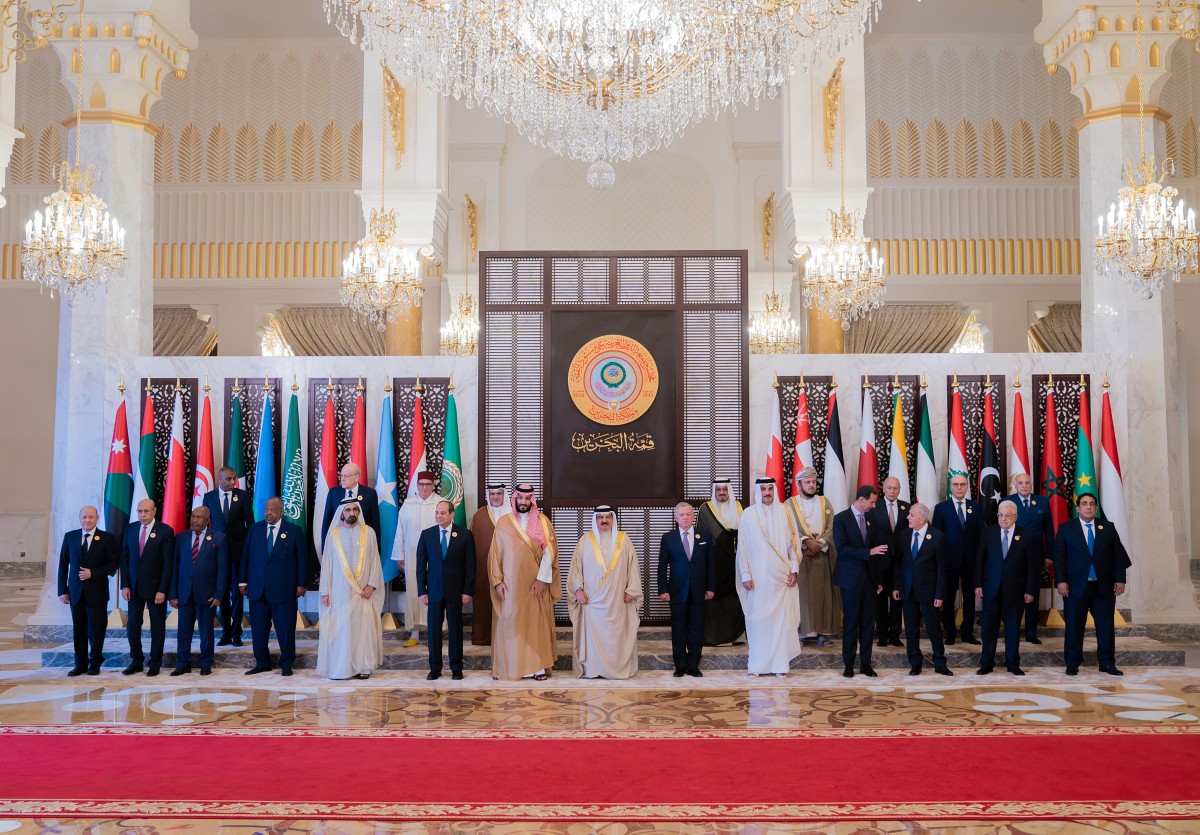Manama, Bahrain – Host Bahrain called for a Middle East peace conference Thursday at the start of an Arab League summit dominated by the Israel-Hamas war, which has been raging in the Gaza Strip without a ceasefire in sight.
King Hamad bin Isa Al Khalifa was addressing fellow heads of state and government at the 22-strong grouping in Manama, more than seven months into a conflict that has convulsed the region.
“(We) call for an international conference for peace in the Middle East, in addition to supporting full recognition of the State of Palestine and accepting its membership in the United Nations,” said the king.
It is the first time the bloc has come together since an extraordinary summit in Riyadh, capital of neighbouring Saudi Arabia, in November that also involved leaders from the 57-member Organisation of Islamic Cooperation, based in the Saudi city of Jeddah.
Palestinian president Mahmud Abbas told the summit his political rivals in Hamas gave Israel an excuse to wage war on Gaza with its October 7 attack from the Palestinian territory.
“The military operation carried out by Hamas by a unilateral decision on that day, October 7, provided Israel with more pretexts and justifications to attack the Gaza Strip,” he said.
‘Open wound’
UN Secretary-General Antonio Guterres described the war in Gaza as “an open wound that threatens to infect the entire region”, calling for “the immediate and unconditional release of all hostages.”
Guterres, who was speaking at the Arab League summit, said “the only permanent way to end the cycle of violence and instability is through a two-state solution”.
While in November leaders declined the approval of punitive steps against Israel, that could change this time around as backing builds globally for a two-state solution long advocated by Arab countries, said Kuwaiti analyst Zafer al-Ajmi.
Western public opinion has become “more inclined to support the Palestinians and lift the injustice inflicted on them” since Israel’s creation more than 70 years ago, Ajmi said.
Meanwhile, Israel had failed to achieve its war objectives including destroying Hamas and was now mired in fighting, he said.
The war broke out after Hamas’s attack on southern Israel which resulted in the deaths of more than 1,170 people, mostly civilians, according to an AFP tally of Israeli official figures.
The fighters also seized about 250 hostages, 128 of whom Israel estimates remain in Gaza, including 36 the military says are dead.
Israel’s military retaliation has killed at least 35,272 people, mostly civilians, according to the Hamas-run Gaza’s health ministry, and an Israeli siege has brought dire food shortages and the threat of famine.
Change of ‘tone’
Israeli Prime Minister Benjamin Netanyahu on Wednesday said nearly 500,000 people had been evacuated from the southern Gaza city of Rafah, where he is insisting on going after remaining Hamas battalions despite objections from US President Joe Biden.
He also disputed claims that Israeli operations there would trigger a “humanitarian catastrophe”, though much of the international community remains squarely opposed to a Rafah invasion.
Against that backdrop, and with mediator Qatar describing talks on a truce and hostage release deal as close to a stalemate, “the tone of Arab countries has changed”, Ajmi said, raising the possibility that the final declaration out of Thursday’s summit could include “binding” measures.
The message would be especially strong coming from a summit held in Bahrain, one of two Gulf countries along with the United Arab Emirates to normalise ties with Israel in 2020 under the US-brokered Abraham Accords.
Beyond the Israel-Hamas war, Arab leaders are also expected to discuss conflicts in Sudan, Libya, Yemen and Syria, whose President Bashar al-Assad was attending the summit after returning to the Arab fold last year.
Attacks by Yemen’s Huthis on Red Sea shipping, which the rebels say are intended as a show of solidarity with Palestinians, could also be on the agenda, said Bahraini analyst and journalist Mahmeed al-Mahmeed.
Bahrain joined a maritime coalition organised by Washington to counter those attacks.
“These vital sea lanes are not only important for countries in the region, but also for the global economy,” Mahmeed said.

